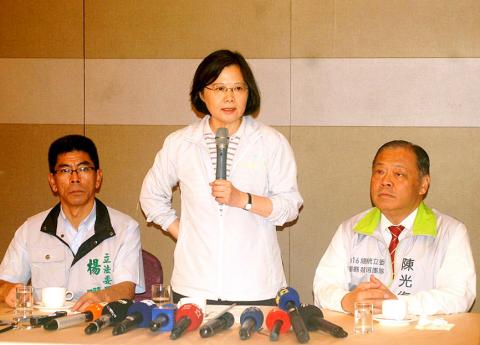Democratic Progressive Party (DPP) presidential candidate Tsai Ing-wen (蔡英文) yesterday said that she would not rule out visiting Beijing and meeting Chinese President Xi Jinping (習近平) if she wins the Jan. 16 election.
Asked by reporters whether she would visit Beijing if invited, given the widespread public criticism of President Ma Ying-jeou’s (馬英九) planned meeting with Xi in Singapore tomorrow, especially from the pan-green camp, Tsai said: “There are just over 70 days left until the election and considering the atmosphere in society, I think the possibility of my visiting Beijing is not too high, but if I am elected next year, if the conditions that I mentioned before — including openness and transparency, equality and dignity, and no politics are met — I would not rule out the possibility.”
However, Tsai took a tougher tone commenting on Ma’s press conference at the Presidential Office yesterday morning and his remark that tomorrow’s meeting would create the basis to “build a bridge” for future meetings and interactions between the leaders of the two sides of the Taiwan Strait.

Photo: CNA
“If Taiwan’s society and its leader do not create the necessary mechanism, and follow the necessary procedures to allow society to take part in the decisionmaking process on major decisions, allowing parliamentary supervision and having transparency of information, then even if there is a bridge, it is not a concrete and stable one,” Tsai said on the sidelines of a campaign event in Penghu County.
The public does not have a problem with cross-strait interactions and meetings of top leaders unless opaqueness becomes an issue, she said.
Later yesterday, DPP Secretary-General Joseph Wu (吳釗燮) said during a radio interview that the DPP would not organize a “supervisory group” to monitor Ma when he is in Singapore, as the party did in 1993 when then-Straits Exchange Foundation chairman Koo Chen-fu (辜振甫) and China’s then-Association for Relations Across the Taiwan Straits chairman Wang Daohan (汪道涵) held a meeting in Singapore.

INVESTIGATION: The case is the latest instance of a DPP figure being implicated in an espionage network accused of allegedly leaking information to Chinese intelligence Democratic Progressive Party (DPP) member Ho Jen-chieh (何仁傑) was detained and held incommunicado yesterday on suspicion of spying for China during his tenure as assistant to then-minister of foreign affairs Joseph Wu (吳釗燮). The Taipei District Prosecutors’ Office said Ho was implicated during its investigation into alleged spying activities by former Presidential Office consultant Wu Shang-yu (吳尚雨). Prosecutors said there is reason to believe Ho breached the National Security Act (國家安全法) by leaking classified Ministry of Foreign Affairs information to Chinese intelligence. Following interrogation, prosecutors petitioned the Taipei District Court to detain Ho, citing concerns over potential collusion or tampering of evidence. The

NEGOTIATIONS: Taiwan has good relations with Washington and the outlook for the negotiations looks promising, Minister of Economic Affairs J.W. Kuo said Taiwan’s GDP growth this year is expected to decrease by 0.43 to 1.61 percentage points due to the effects of US tariffs, National Development Council (NDC) Minister Paul Liu (劉鏡清) said at a meeting of the legislature’s Economics Committee in Taipei yesterday, citing a preliminary estimate by a private research institution. Taiwan’s economy would be significantly affected by the 32 percent “reciprocal” tariffs slapped by the US, which took effect yesterday, Liu said, adding that GDP growth could fall below 3 percent and potentially even dip below 2 percent to 1.53 percent this year. The council has commissioned another institution

NEGOTIATIONS: The US response to the countermeasures and plans Taiwan presented has been positive, including boosting procurement and investment, the president said Taiwan is included in the first group for trade negotiations with the US, President William Lai (賴清德) said yesterday, as he seeks to shield Taiwanese exporters from a 32 percent tariff. In Washington, US Trade Representative Jamieson Greer said in an interview on Fox News on Thursday that he would speak to his Taiwanese and Israeli counterparts yesterday about tariffs after holding a long discussion with the Vietnamese earlier. US President Donald Trump on Wednesday postponed punishing levies on multiple trade partners, including Taiwan, for three months after trillions of US dollars were wiped off global markets. He has maintained a 10 percent

TRADE: The premier pledged safeguards on ‘Made in Taiwan’ labeling, anti-dumping measures and stricter export controls to strengthen its position in trade talks Products labeled “made in Taiwan” must be genuinely made in Taiwan, Premier Cho Jung-tai (卓榮泰) said yesterday, vowing to enforce strict safeguards against “origin laundering” and initiate anti-dumping investigations to prevent China dumping its products in Taiwan. Cho made the remarks in a discussion session with representatives from industries in Kaohsiung. In response to the US government’s recent announcement of “reciprocal” tariffs on its trading partners, President William Lai (賴清德) and Cho last week began a series of consultations with industry leaders nationwide to gather feedback and address concerns. Taiwanese and US officials held a videoconference on Friday evening to discuss the